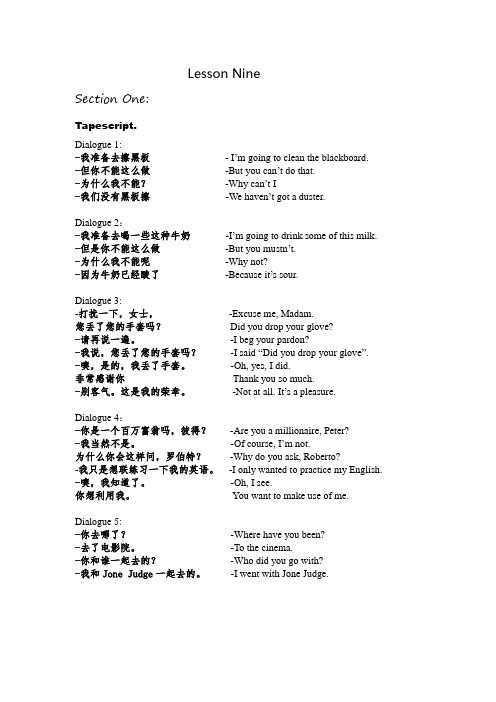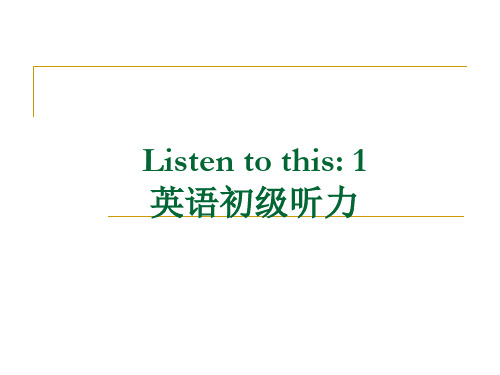捷进英语语音初级版 Lesson 9 第二课时
现代新理念英语捷径英语语音(初级版)测试卷1到9单元

现代新理念英语捷径英语语音(初级版)测试卷1到9单元摘要:1.现代新理念英语捷径英语语音(初级版) 测试卷概述2.测试卷的内容和结构3.测试卷的适用对象和作用4.如何高效利用测试卷进行学习和复习5.结论正文:一、现代新理念英语捷径英语语音(初级版) 测试卷概述现代新理念英语捷径英语语音(初级版) 测试卷是一套针对英语初学者的语音训练教材,旨在帮助学生掌握英语语音基础知识,提高语音识别和发音能力。
该测试卷共分为9 个单元,每个单元都包含一定数量的测试题,学生在完成每个单元的测试题后,可以全面地了解自己对本单元语音知识的掌握情况。
二、测试卷的内容和结构现代新理念英语捷径英语语音(初级版) 测试卷的内容主要包括英语音标、发音技巧和语音知识。
测试卷的结构分为以下几个部分:1.音标测试:这部分主要测试学生对英语音标的掌握程度,要求学生根据所给音标正确地读出相应的单词。
2.发音技巧测试:这部分主要测试学生对英语发音技巧的理解,要求学生根据所给单词选择正确的发音方式。
3.语音知识测试:这部分主要测试学生对英语语音知识的掌握,包括重音、连读、失去爆破等。
三、测试卷的适用对象和作用现代新理念英语捷径英语语音(初级版) 测试卷适用于英语初学者,特别是那些希望提高英语语音能力的学生。
通过使用这套测试卷,学生可以全面地了解自己的语音知识水平,找出自己的薄弱环节,并通过反复练习来提高自己的语音能力。
四、如何高效利用测试卷进行学习和复习为了高效地利用现代新理念英语捷径英语语音(初级版) 测试卷进行学习和复习,学生可以采取以下方法:1.在学习每个单元的语音知识后,及时进行测试卷的练习,以检验自己对本单元知识的掌握程度。
2.对于做错的题目,要认真分析错误原因,并加强对相关知识点的学习和理解。
3.定期进行自我检测,以检验自己的语音能力是否得到了提高。
4.多与同学交流,分享彼此的学习心得和经验,互相鼓励,共同进步。
五、结论现代新理念英语捷径英语语音(初级版) 测试卷是一套非常适合英语初学者的语音学习教材,通过使用这套测试卷,学生可以全面地了解自己的语音知识水平,找出自己的薄弱环节,并通过反复练习来提高自己的语音能力。
外研社《英语初级听力》第9课课文翻译

Lesson NineSection One:Tapescript.Dialogue 1:-我准备去擦黑板- I‟m going to clean the blackboard.-但你不能这么做-But you can‟t do that.-为什么我不能?-Why can‟t I-我们没有黑板擦-We haven‟t got a duster.Dialogue 2:-我准备去喝一些这种牛奶-I‟m going to drink some of this milk. -但是你不能这么做-But you mustn‟t.-为什么我不能呢-Why not?-因为牛奶已经酸了-Because it‟s sour.Dialogue 3:-打扰一下,女士,-Excuse me, Madam.您丢了您的手套吗?Did you drop your glove?-请再说一遍。
-I beg your pardon?-我说,您丢了您的手套吗?-I said “Did you drop your glove”.-噢,是的,我丢了手套。
-Oh, yes, I did.非常感谢你Thank you so much.-别客气。
这是我的荣幸。
-Not at all. It‟s a pleasure. Dialogue 4:-你是一个百万富翁吗,彼得?-Are you a millionaire, Peter?-我当然不是。
-Of course, I‟m not.为什么你会这样问,罗伯特?-Why do you ask, Roberto?-我只是想联练习一下我的英语。
-I only wanted to practice my English. -噢,我知道了。
-Oh, I see.你想利用我。
You want to make use of me. Dialogue 5:-你去哪了?-Where have you been?-去了电影院。
捷进英语 Unit 2

捷进英语Unit 2老猴子咬菜根学习交流Unit 2 Lesson 1 Baby talk. 儿语Hi Sherise. 嗨,Sherise。
Hello Sherise. 你好,Sherise。
Where's Sherise? Sherise去哪儿了?Has Sherise gone to the movies? Sherise去看电影了吗?No,she hasn't. 不,没有。
She's right here! Wuh-wuh-wuh... 她就在这儿!Excuse me? 对不起。
Oh! Good morning. 噢!早上好。
Good morning, Wendy. 早上好,Wendy。
Friend of yours? 你的朋友?That's Sherise. 她是Sherise。
Where's Sherise? Sherise在哪儿?Sherise is in the restaurant. Sherise在餐厅。
The question is, who is Sherise? 问题是,Sherise是谁?Nina's baby. Nina的小孩。
Oh. 噢。
And where is Nina? 那么Nina在哪儿?She's at a meeting. 她在开会。
And where's the meeting? 在哪儿开会?At the Children's Center. 在儿童中心。
Nina's gone to a meeting at the Children's Center, and her baby is here?Nina去儿童中心开会了,而她的孩子在这儿?That's right. 对。
Has Sherise gone to the meeting? Sherise去开会了吗?No,she hasn't.没有。
捷进英语B2U6PPT课件

-
Sense and Memory
译 文
时间 随着年龄的增长, 时间似乎过得越来越快,这是因为我们日复一日地做着同 样的事情,过着同样的生活。第一次做某件事情通常会给我们留下深刻的记 忆。还记得你第一天上学或第一天上班吗?但一旦我们重复这些事情,便不 会再产生深刻的记忆,时间也就过得快了。
Time The reason time seems to go more quickly as we get older is that we
-
emotion
Back to Vocabulary
n. 情感;情绪
e.g. How do you manage your emotion?
你是怎样调整情绪的呢?
-
particularly
Back to Vocabulary
adv. 尤其;特别
e.g. I particularly like wooden furniture.
Sense and Memory
译 文
感官与记忆
你有过这些经历吗? • 你正在校园里散步,突然一种熟悉的味道使你想起你的祖母,你开始想家了。 • 随着年龄的增长,你感到日子过得飞快。 • 你准备听讲座时听到一首歌,然后它就整天在你耳边回响。 事实上,我们的感官和记忆之间的关系之密切远超过我们的想象。
捷进英语捷径英语PPT课件

it came to my turn…
第一堂课开始时,老师介绍了她自己,并且让我们做自我介绍。一 门新课开始时,往往都会先来个自我介绍,但你仍能感觉到将要轮到谁 发言时,他都会紧张得心跳加速。一个女孩几乎说不出自己的名字;另 一个男孩刚站起来说话他的手机就响了起来,然后就轮到我了。
.
不幸的是,我紧张的时候常常不知道什么时候该停止说话。我不很确 定我说了什么或我讲了多长时间,但当我坐下来的时候很多人都在看着我。 有些人露出吃惊的样子,有些人面露微笑。接下来的那个男孩站起来说: “我会把这个介绍弄短点儿。我是尼克斯,”他就这样说完然后坐下了。 大家都看着我笑了。我也朝大家笑了笑,整间教室里的人一下子都放松了 下来。
expected.
1) 我很wa早ke就u起p:床s了to,p 比sl我ee预pi料ng的; 早to得m多ak。e sb. stop sleeping 醒来;
叫醒
e.g. I didn’t wake up until I heard the alarm clock.
5 AUDIO/VIDEO LAB
6
WRAP-UP
.
WARM-UP
Task 1 Match the pictures to the reasons why people go to
college.
☐G 1 To learn something new
from lectures.
☐D 2 To meet new people. ☐H 3 To live away from home. ☐E 4 To get a good job. ☐B 5 To become rich. ☐C 6 To make their parents
电话里他的声音听起来有些紧张(颤抖)。
英语初级听力lessonnine精品PPT课件

Dialogue5 He went to see a film.
—Where have you been? —To the cinema. —Who did you go with? —I went with Jone Judge.
Dialogue6 He has damaged his wrist.
—What's wrong? —I have a pain in my chest. —Why not go and see your doctor? —Yes. That's a good idea. I will.
Dialogue8 Because wants to know the time.
—What can I do for you? —I have damaged my wrist, doctor. —How did you do that? —I fell on it while I was playing tennis.
Dialogue7 She has a pain I her chest.
Wrist [rɪst] n. 手腕;腕关节 Tennis [‘tɛnɪs] n. 网球(运动) Pain [pen] n. 疼痛;努力
She gave me some medicine to dull the pain. 她给了我一些可减轻疼痛的药。 Chest [tʃɛst] n. 胸,胸部;衣柜;箱子;金库 get something off your chest倾吐心中的烦恼 Play cards打扑克 Boil [bɔɪl] vi. 煮沸,沸腾;激动,激昂 vt. 煮沸,烧开;使…激动;使…蒸发
Dialogue4 Because he wants to practice his English.
(完整word版)新概念英语第二册第九课

Lesson 9 A cold welcomeOn Wednesday evening, we went to the Town Hall. It was the last day of the year and a large crowd of people had gathered under the Town Hall clock. It would strike twelve in twenty minutes' time. Fifteen minutes passed and then, at five to twelve, the clock stopped. The big minute hand did not move。
We waited and waited, but nothing happened。
Suddenly someone shouted. 'It’s two minutes past twelve! The clock has stopped!' I looked at my watch。
It was true. The big clock refused to welcome the New Year。
At that moment, everybody began to laugh and sing.New words and expressions 生词和短语welcome n。
欢迎;v. 欢迎 crowd n。
人 gather v. 聚集hand n. (表或机器的)指针shout v. 喊叫 refuse v。
拒绝 laugh v. 笑参考译文星期三的晚上,我们去了市政厅。
那是一年的最后一天,一大群人聚集在市政厅的大钟下面。
再过20分钟,大钟将敲响12下.15分钟过去了,而就在11点55分时,大钟停了。
那根巨大的分针不动了。
冀教版英语七上Lesson 9 Whose Coat Is This精品课件(35页)

它们对我来说正合适!
11
课文呈现
Jenny: Whose coat is this? Is it your coat, Danny? Danny: No. It's too big for me. It's Bob's coat. Mr. Jones: Whose scarf is this? Is it your scarf, Jenny? Jenny: No, it‘s not my scarf. It’s Kim’s scarf.
→ Whose book is this? 这是谁的书?
11
课文呈现
4) Work in pairs. Look at the items in the “Lost and Found”. Whose items are they? Make up a dialogue. Example: A: Is this your pencil box? B: No, it isn't. A: Whose pencil box is it? B: Maybe it's Yang Huimin's pencil box.
11
课文呈现
2) Read the lesson and circle the correct words. 1.The coat is(too big/too small/just right)for Danny. 2.The gloves are(too big/too small/just right)for Jenny. 3.The shorts are(too big/too small/just right)for Danny.
